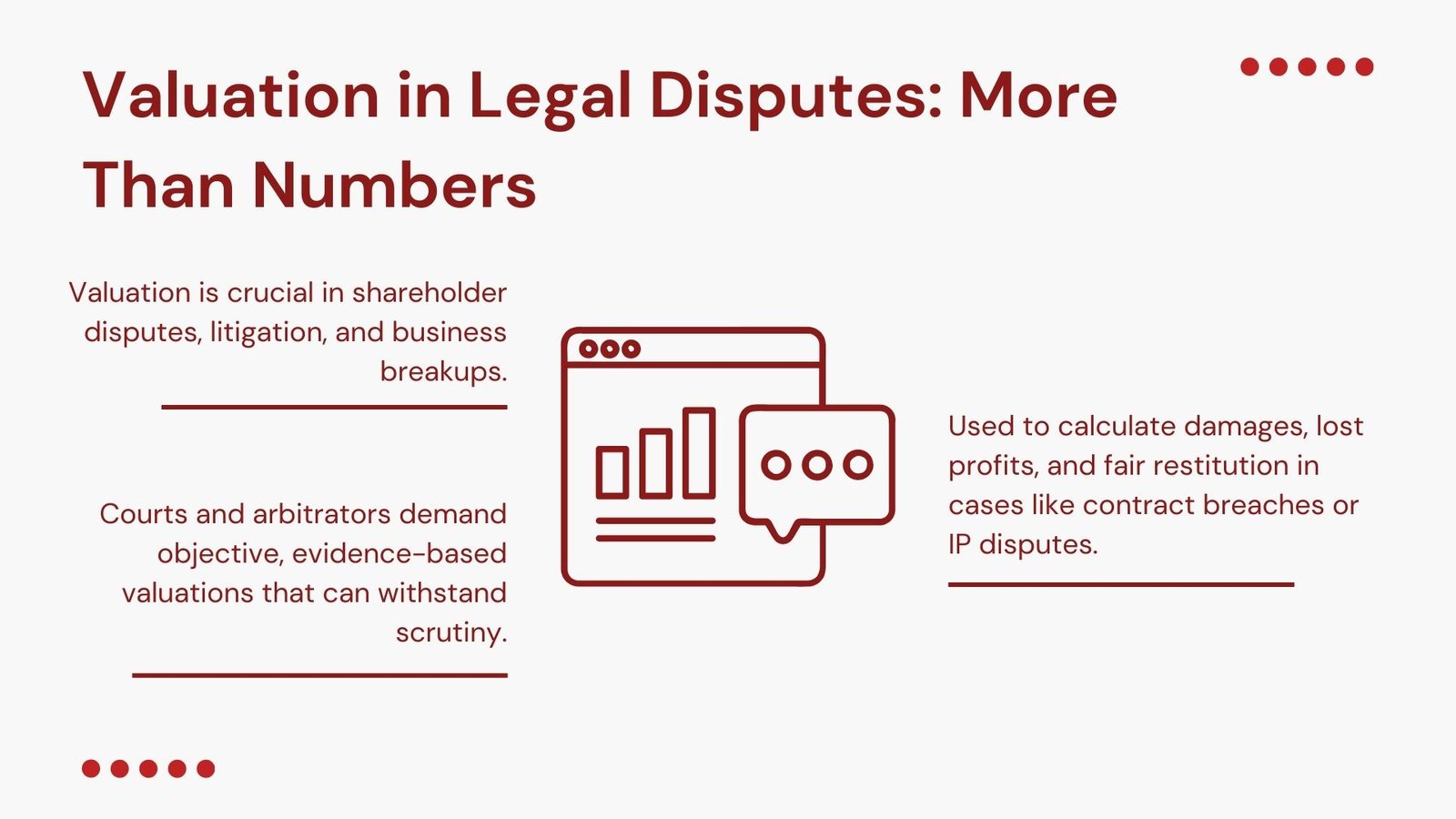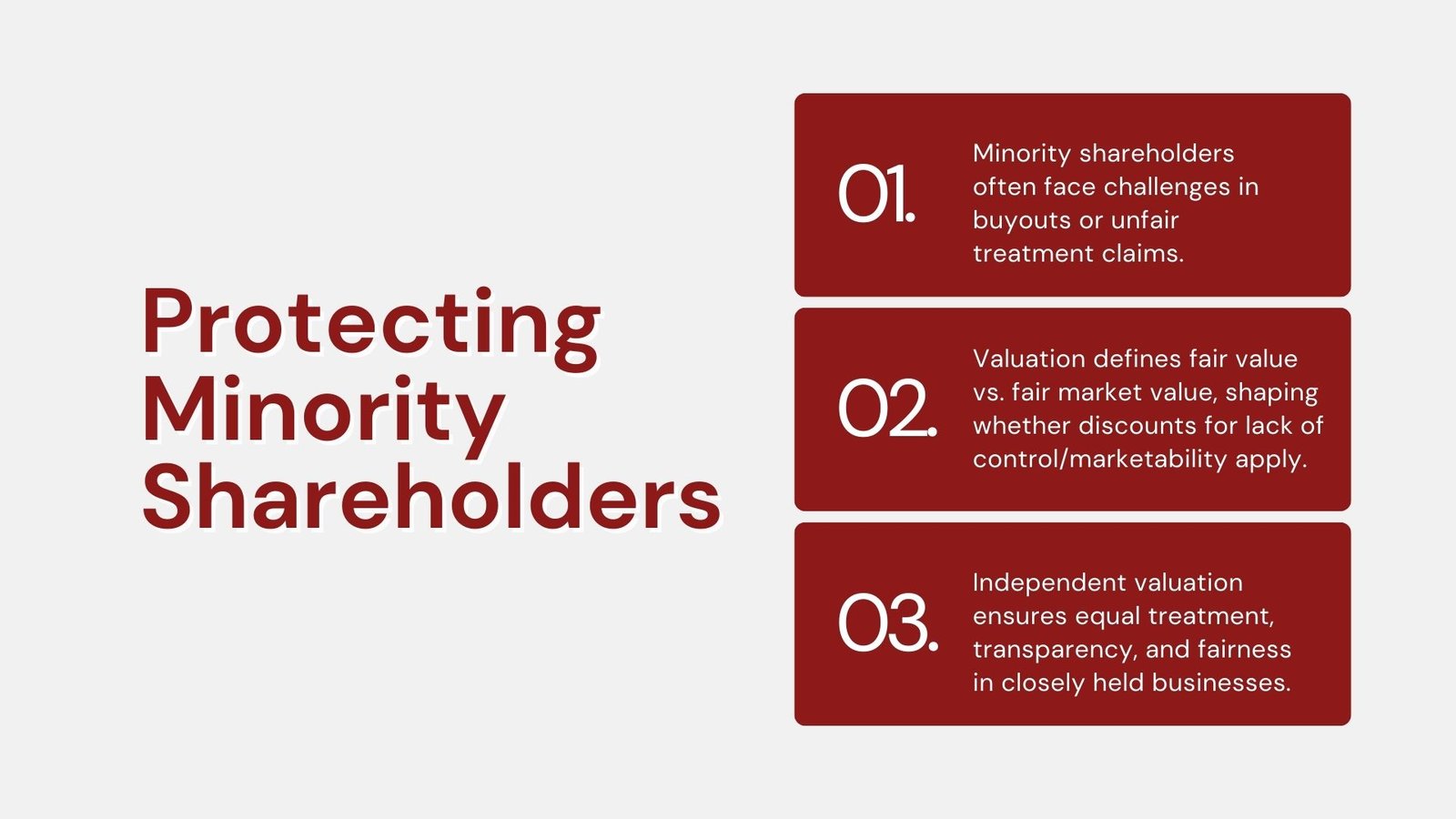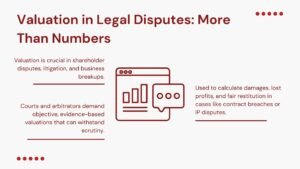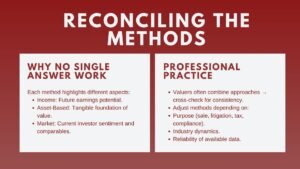
How Valuation Supports Disputes and Legal Needs in Singapore
How Valuation Supports Disputes and Legal Needs in Singapore
Understanding Valuation for Disputes Legal Needs
People also tend to consider valuation as a process of mergers, sales, or investment, but it is also important when dealing with various arguments and settling a dispute, compensating minority shareholders, and other legal aspects. In case of conflicts, whether in shareholders disputes, business breakups, or litigation processes, accurate and defensible valuation is needed so as to achieve fair conclusions. This form of valuation is more than a numbers game- it’s about an indifferent, objective and evidence-based measure of value that can stand up in a legal battle. Valuation in these situations goes through an extra level of scrutiny by a court, arbitrators, and other parties that imply that the procedure should be comprehensive, transparent, and consistent with applicable law. For professionals seeking guidance, resources such as effective valuation improvement tips Singapore can provide valuable insights.
In business litigation, valuation became the basis of valuation of damages, fair restitution or compensation of the loss or loss of opportunity. The procedure becomes complicated in the case of the minority shareholder interests as there are certain rights, restrictions, and fair value or fair market value legal definitions. In a legal context, whether with cases related to bankruptcies, marital dissolutions, or any contractual dispute, valuation is an important piece of evidence that might end up changing the way the negotiations go or the results of a court decision. In any of these situations it can be the capacity to give a well backed and well documented valuation that can be the distinction between a suitable result and a lengthy costly wrangle, reinforcing why many often ask, do we need business valuation in Singapore to secure fair outcomes in legal disputes.

The Role of Valuation in Commercial Disputes
Valuation is vital in explaining the economic reality of a situation, in situations where litigation is involved. Causes of disagreements might be actions of breach of contract, violation of intellectual property, dissolution of the partnership or contentious transactions. In both situations, the parties tend to differ over the amount the business or the asset at issue or the damages sustained. An independent third-party appraisal document acts as factual touchstone, which allows the business of negotiation to take place, and also give the court or tribunal ample ground within which they can make their decisions.
As an example, when a breach of contract, unfair competition took place a valuation can be conducted to measure the profit that was lost due to the actions of the offending party. In an intellectual property dispute i.e. patent or trademark, valuation may be used to measure damages in terms of lost sales, lost market share or brand value. Since dispute valuations are commonly questioned within a legal environment, the technique has to be open and the assumptions should be sensible with high powered data. Lack of such compliances may result in the rejection of the valuation and an adverse legal decision.
Determining Fair Compensation for Minority Shareholders
The minority shareholder in the majority of instances may be involved in a dispute when a high majority shareholder tries to purchase out the interests of minority owners, or when the minority owners complain that their interests have been unfairly treated, or had a breach of fiduciary duty situation. In these situations, resolution of what is an acceptable value of the minority interest becomes one of the most disputable ones. Value as defined in the law–usually fair value instead of fair market value–may control the application of discounts relating to lack of control or lack of marketability, or even whether any such considerations should be applicable.
During the calculation of the minority interest, much attention should be paid to the rights of a shareholder according to the corporate bylaws, shareholder agreements, and the law. Other jurisdictions also provide that in valuing fair value, particular discounts are not permitted to protect the interest of minority owners by providing compensation appropriately. This can go far to influence the ultimate valuation particularly in closely held businesses where there is otherwise the possibility of a very heavy discount due to the absence of a ready public source of market in the shares. An independent third party often becomes a third party and assesses an impartial valuation on a financial and acceptable level under law that helps in removing further dispute as well as ensuring that the minority stockholder is being treated equally fairly.

Legal Valuation Needs Beyond Shareholder Disputes
Legal valuation goes far beyond the problem of shareholder disputes. Business valuations can be crucial in the process of divorce whereby the parties have to determine the value of the marital estate and sharing of marital property. Valuation in bankruptcy aids in determining the value of assets of a debtor which is used to decide the liquidation strategy or the rearranging plan. Valuations are also necessary in case of estate and gift tax issues where there might be issues of adhering to tax requirements and avoiding issues with respective authorities.
Valuation is also quite often necessary in contract disputes. An example is provided in a contract with buyouts or earnouts or that includes arrangements of performance-based payments and valuation is required to ascertain the values due. Other areas where the evidence of valuation can be crucial in settling the disputed legal outcome include, intellectual property litigation, eminent domain cases as well as partnership dissolutions. In both of these circumstances, reliable methodologies need to be employed to justify the valuation and it should be reported in a manner that can stand the test of cross-examination in a court.
Methodological Considerations in Dispute and Legal Valuations
The field of valuation of disputes and law law usually makes use of the similar principle approaches that are employed in other scenarios–the income, market, and asset-based approach, but making modifications to comply with legal precedent and satisfy the details of the case. As such, the income technique in damage claims may concentrate on lost returns or reduced money flows whereas in shareholder lawsuits, the market strategy may be constrained by absence of comparable sales. The Asset-based approach can be very applicable in situations of liquidation or business situations where tangible assets were more dominant than others.
Legal valuations also consider jurisdiction specific rules and definitions of value. The determination of fair market value vs fair value can change the result considerably as can treatment of discounts and premiums. Moreover, one should thoroughly check assumptions, and any weakness is to be used in a lawsuit. There are also situations where several methods can be applied in conjunction so as to come up with a better and justifiable valuation. It is not only good to get the right number but also be able to communicate why one came up with it and what evidence they based it on.
The Importance of Expert Witness Testimony
In cases in which valuations are engaged in a legal context, the role of the expert manager is more than advancing a report. Expert witnesses can testify in a court of law, appear before an arbitration and even be involved in mediation. The capacity to present complicated notions of valuation in understandable and comprehensible ways is fundamental in convincing judges, juries or arbitrators. Expert credibility cannot be overlooked; A technically sound valuation can certainly be ignored when the expert witness appears to be biased or is not capable of defending his/her finding during the cross-examination.
A skilled professional valuator will train by practicing testimony before a jury or commission decision-making panel in order to prepare to test any weaknesses in his or her methodology and assumptions. They should be prepared to discuss why or why not specific strategies were implemented, how major variables were identified and what their findings and conclusions can or should be based upon in terms of objectivity of financial theory, and what the standard legal precedent was. This seriousness in analysis along with the lucid explanation is sufficient to make the valuation admissible in court.
Conclusion: Achieving Fair Outcomes Through Robust Valuation
Finally, valuation does much more than a technical or mathematical exercise, it has a role in arriving at fairness, resolving disputes and serving the purpose of legal compliance in circumstances in which financial interests touch on legal rights. Where the parties have a dispute of shareholder remuneration or marital dissolution, damages awards or contract notifications, a solid valuation process will be the basis of fair results. The potential cost can be greater and when valuations are not well prepared or well substantiated, the outcome could mean great financial loss, litigation, or disputes left unresolved.
To obtain equitable and justifiable outcomes, valuation process must be both technically accurate and guided by law. It demands to be objective, clear, and able to present the results in a form that should be comprehensible to diverse stakeholders, including the courts and legal advisors, business leaders, and individuals. This duality of technical quality and understandability both guarantees quality of results as well as makes it trusted by everyone involved in the process.
Strong valuation is useful beyond solving a financial problem; it leads to trust, conflict reduction and good ethical principles in a challenging case. When it is undertaken with the responsible scope, it turns into a fulfilling tool of assisting justice, enhancing decision making, and facilitating adequate settlements that pass the test of audit both financially and legally.














